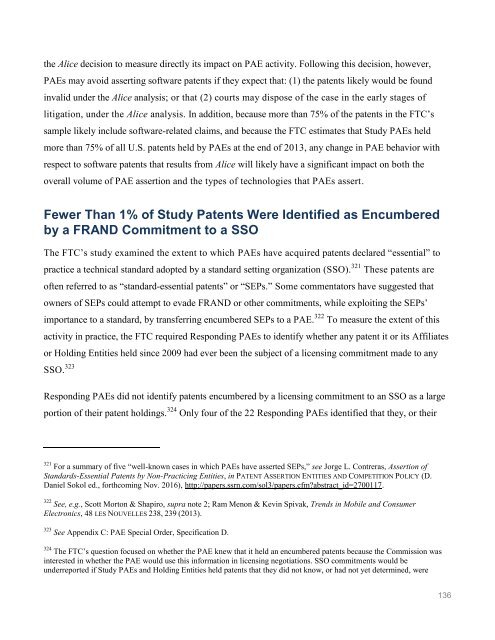Create successful ePaper yourself
Turn your PDF publications into a flip-book with our unique Google optimized e-Paper software.
the Alice decision to measure directly its impact on PAE activity. Following this decision, however,<br />
PAEs may avoid asserting software patents if they expect that: (1) the patents likely would be found<br />
invalid under the Alice analysis; or that (2) courts may dispose of the case in the early stages of<br />
litigation, under the Alice analysis. In addition, because more than 75% of the patents in the FTC’s<br />
sample likely include software-related claims, and because the FTC estimates that Study PAEs held<br />
more than 75% of all U.S. patents held by PAEs at the end of 2013, any change in PAE behavior with<br />
respect to software patents that results from Alice will likely have a significant impact on both the<br />
overall volume of PAE assertion and the types of technologies that PAEs assert.<br />
Fewer Than 1% of Study <strong>Patent</strong>s Were Identified as Encumbered<br />
by a FRAND Commitment to a SSO<br />
The FTC’s study examined the extent to which PAEs have acquired patents declared “essential” to<br />
practice a technical standard adopted by a standard setting organization (SSO). 321 These patents are<br />
often referred to as “standard-essential patents” or “SEPs.” Some commentators have suggested that<br />
owners of SEPs could attempt to evade FRAND or other commitments, while exploiting the SEPs’<br />
importance to a standard, by transferring encumbered SEPs to a PAE. 322 To measure the extent of this<br />
activity in practice, the FTC required Responding PAEs to identify whether any patent it or its Affiliates<br />
or Holding Entities held since 2009 had ever been the subject of a licensing commitment made to any<br />
SSO. 323<br />
Responding PAEs did not identify patents encumbered by a licensing commitment to an SSO as a large<br />
portion of their patent holdings. 324 Only four of the 22 Responding PAEs identified that they, or their<br />
321<br />
For a summary of five “well-known cases in which PAEs have asserted SEPs,” see Jorge L. Contreras, <strong>Assertion</strong> of<br />
Standards-Essential <strong>Patent</strong>s by Non-Practicing Entities, in PATENT ASSERTION ENTITIES AND COMPETITION POLICY (D.<br />
Daniel Sokol ed., forthcoming Nov. 2016), http://papers.ssrn.com/sol3/papers.cfm?abstract_id=2700117.<br />
322<br />
See, e.g., Scott Morton & Shapiro, supra note 2; Ram Menon & Kevin Spivak, Trends in Mobile and Consumer<br />
Electronics, 48 LES NOUVELLES 238, 239 (2013).<br />
323<br />
See Appendix C: PAE Special Order, Specification D.<br />
324<br />
The FTC’s question focused on whether the PAE knew that it held an encumbered patents because the Commission was<br />
interested in whether the PAE would use this information in licensing negotiations. SSO commitments would be<br />
underreported if Study PAEs and Holding Entities held patents that they did not know, or had not yet determined, were<br />
136


